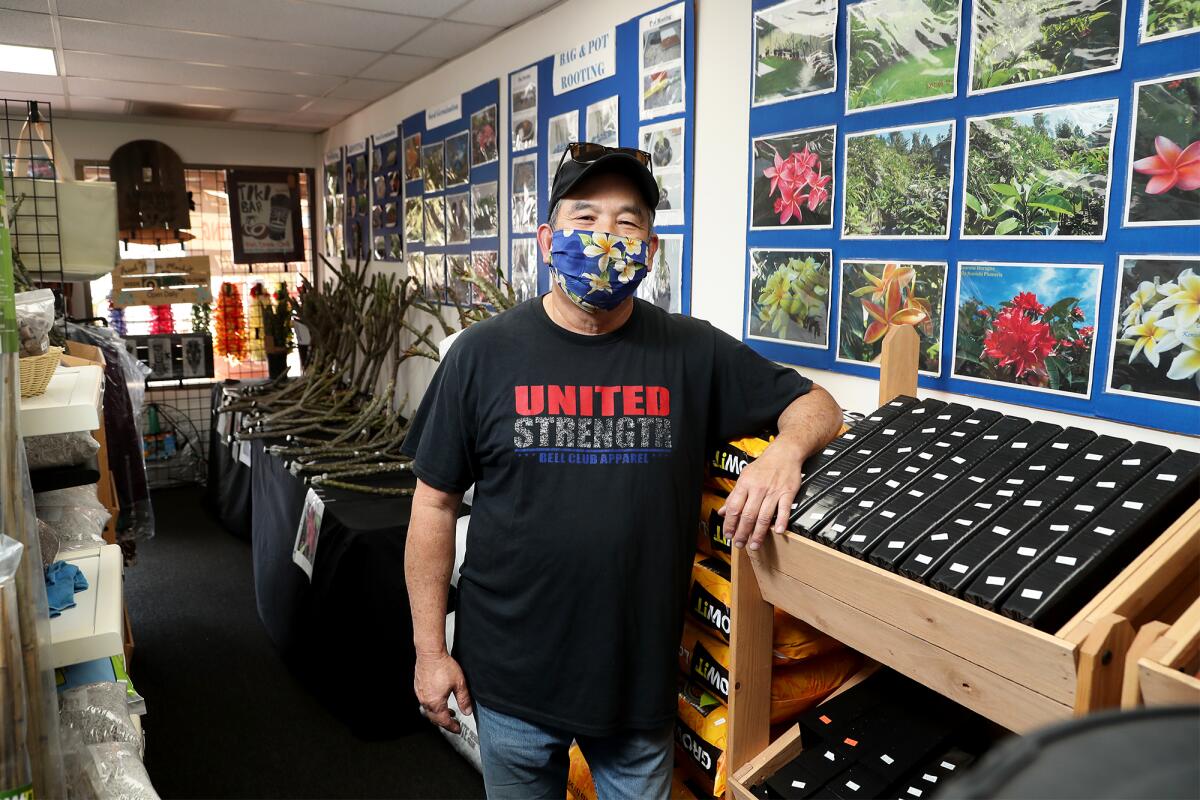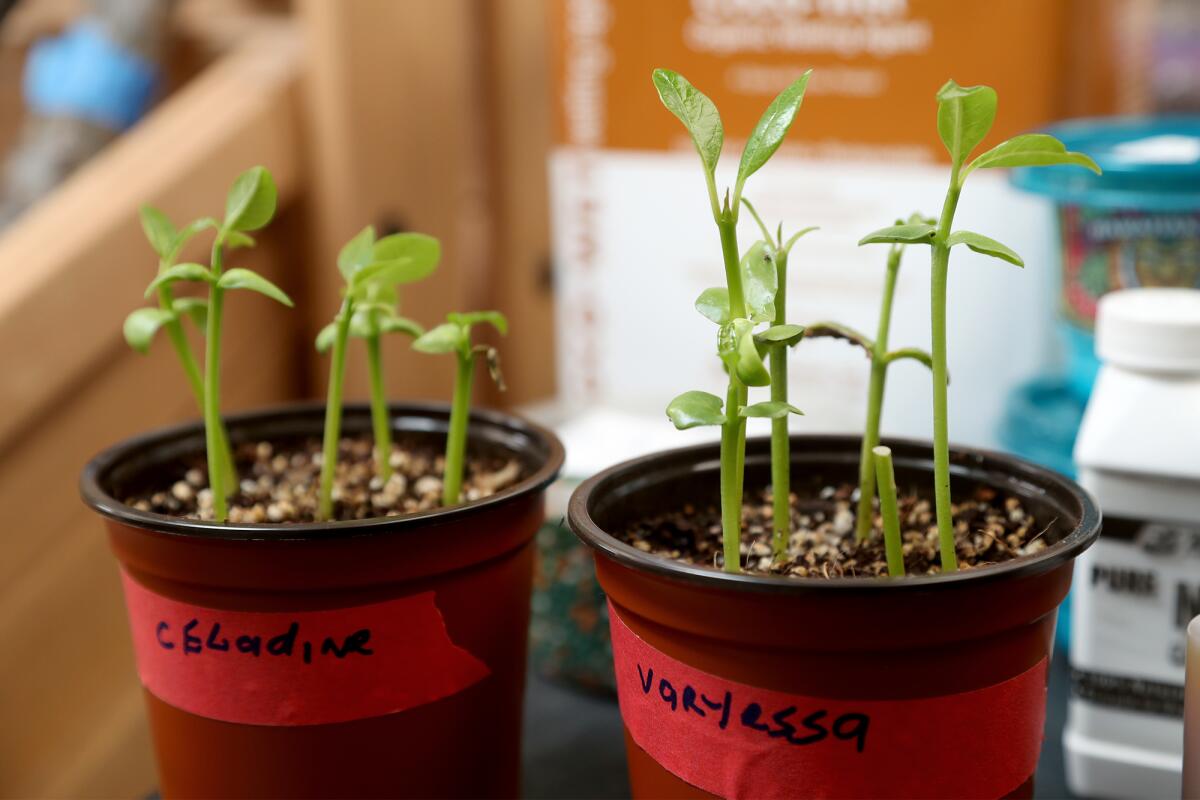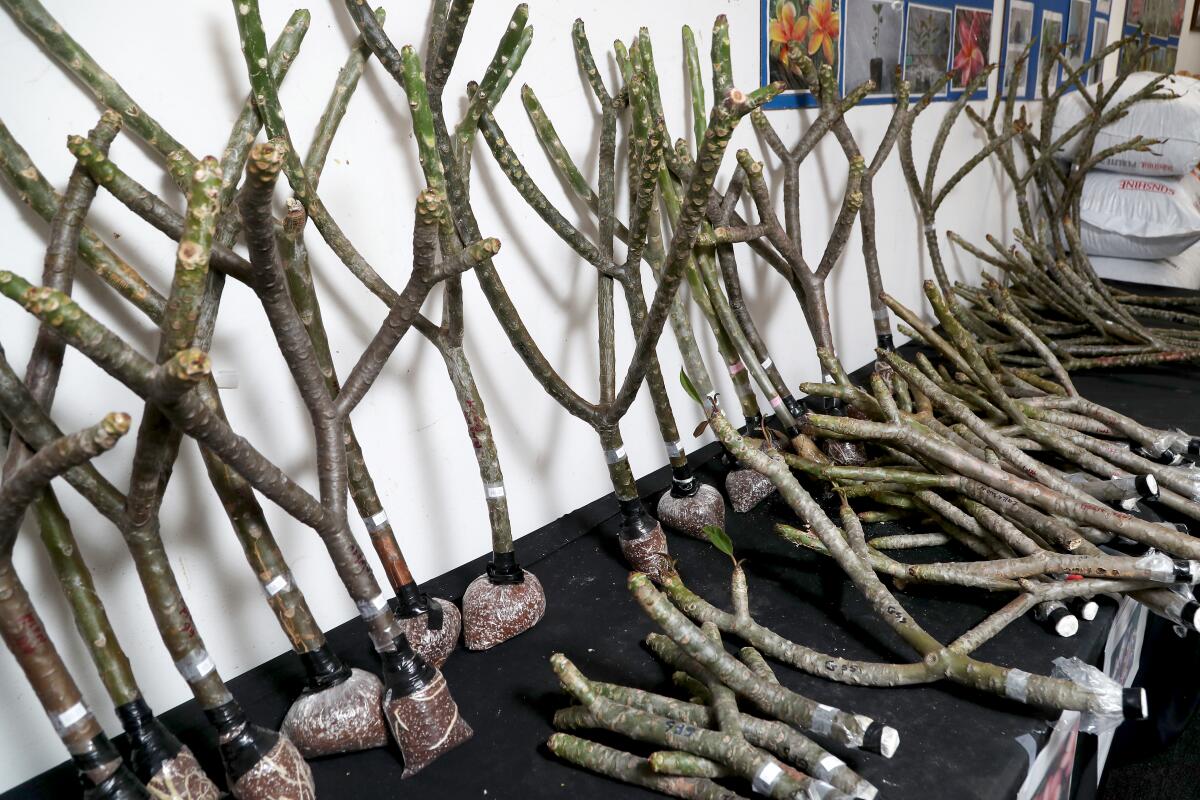Orange County plumeria growers help stem the losses of a Texas cold snap

- Share via
When David Konishi lost his plumerias in the Orange County freeze of 2007, complete strangers mailed him cuttings from their own trees so he could rebuild his collection.
Humbled, Konishi vowed that one day, if ever called to do so, he would pay it forward. That day arrived this past February.
Konishi, who owns Konishi Plumeria in Cypress, was on his plumeria growers Facebook group when messages started popping up from Texans who were helplessly watching their deliciously scented tropical trees die in a freak cold snap.
Houston is home to the Plumeria Society of America, so there are a lot of growers in that state. Plumeria, heat-lovers native to the tropics, need to be protected when the temperature drops below 40.
That’s why growers build greenhouses for wintertime. And if you don’t have a greenhouse, you have a plan to haul your plumerias into your house (even digging them out of the ground if you have to) when weather forecasters warn that a cold snap is coming.

But who has a plan for a power outage on top of a freeze? Without heat in their homes, Texans had no chance of saving their collections. Specimens, some decades old, perished within hours; branches just falling off, bleeding brown mush.
“I live in Texas and lost all my plumeria in the arctic blast,” a woman named Nelda posted on Facebook. “My heart is broken, so many hours … nurturing them for years.”
And from a woman named Monica: “Lost my plumeria that I brought home from Hawaii 24 years ago as a gift to my mother. Heartbroken as she passed, and the plant was like a memorial.”
Konishi, who figures he has spent at least $10,000 on his own private plumeria collection at his home in Cerritos, said he actually spoke with some of the growers.
“There were people crying to me on the phone,” he says. “And I understood what they were going through.”
A few told him they were too devastated — and/or broke — to start again. A single branch can cost anywhere from $20 to up to several hundred bucks for one of the trendier varieties. And mature plants cost even more.
“We had some private moments, and they said goodbye,” he says.

Konishi started snapping branches off of his own trees and rallying the troops on his Facebook growers group, which has members as far as Malaysia, Indonesia, Africa and Iceland. He would pay for shipping if they didn’t have the money; just send him the receipts.
In case you’re not familiar with plumeria, by the way, you should know they might be the easiest plant to mail. Just break off a branch, wrap it in some newspaper, drop it in a box and send. All the recipient needs to do upon arrival is stick it in some dirt, water it and put it in the sun.
Konishi wasn’t the only Orange County plumeria fanatic to spring into action.
C.d. Larson encountered his first plumeria in Tahiti in 1985. Now he has a dozen mature trees at his Foothill Ranch home; making leis with their blossoms to wear around town during the summer months.
“People look at me like, ‘Did you win something?’”
It warms his heart to see plumeria trees festooning countless yards throughout Southern California, many grown from branches people brought back from their honeymoons.
“There’s a certain romance to that,” he says.
So when he saw the social media posts from Texans watching their trees collapse, he was “just shredded.”
He started snapping off branches in his own backyard to ship to the Lone Star State — and reached out to Jaki Kamphuis, a professor at Orange Coast College and president of the South Coast Plumeria Society. She organized a cutting drive.
“People were posting pictures of their plumerias covered with snow,” Kamphuis says. “It would be devastating. We kind of treat them like our babies.”
A self-described “plumeria addict,” she confesses to at one point mothering about 300 of the tropical trees at her Huntington Beach home.
“For me it’s all about the fragrance,” she says. “Some smell like roses, some smell like peaches or Bazooka bubble gum.” Even suntan lotion.
“There are so many varieties (over 500). That’s why people have so many plants.”
Plumeria Society of America president Ray Allison, a commercial realtor in Houston, says he has been overwhelmed by the response.
“We were getting phone calls from people who wanted to help, and we were ‘Hey, we haven’t even thawed out yet!’” says Allison.
He reckons he’s received 1,500 donated cuttings, more than half of them from the Southern California plumeria community, with clubs in Ventura and San Diego counties also coming to the rescue.
“It warms my heart to hear so many people offering to donate for those of us here in Texas that have lost so much,” a woman named Michelle posted on the society’s Facebook page. “Thank you so much for your compassion and generosity!”
Lori Basheda is a contributor to TimesOC.
All the latest on Orange County from Orange County.
Get our free TimesOC newsletter.
You may occasionally receive promotional content from the Daily Pilot.



